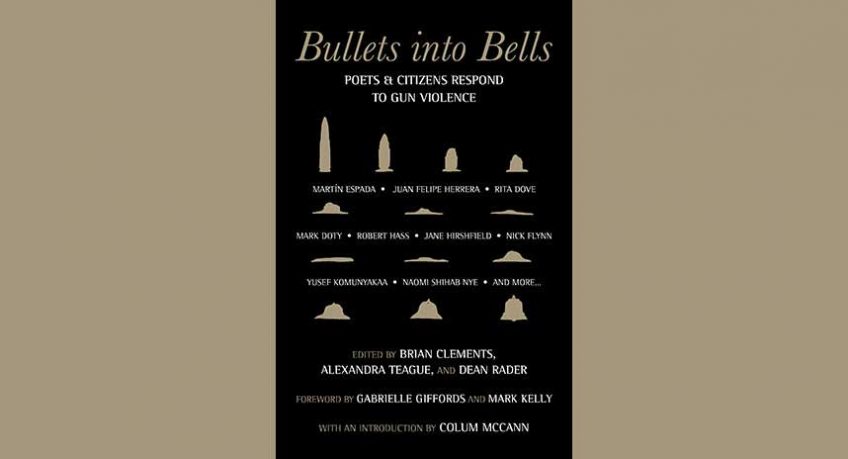Two statements from very different poets, set the agenda for Bullets into Bells: Poets and Citizens Respond to Gun Violence, a unique anthology of poetry and reflections on guns. “If you speak, you die. If you keep quiet, you die. So, speak and die,” wrote Algerian poet and journalist Tahar Djaout, who in 1993 was shot and killed by a fundamentalist group. Wallace Stevens describes poetry as “a violence from within that protects us from a violence without. It is the imagination pressing back against the pressure of reality.”
The staggering, unimaginable reality in the United States is cited in the book: our nation suffers more than 30,000 shooting deaths annually, including suicides, accidents, and assaults. In this anthology, 54 poets respond to this reality by—in essence—asserting, “speak and live.”
The times necessitate moving beyond debate about guns into a new territory of nuance, perhaps accessible only through poetry and other creative arts. Poets and artists are the doorkeepers who usher us into the interior of this national horror.
The book is constructed as a litany. Each poem is echoed by a short reflection written by the “citizens” referred to in the book’s subtitle. They aren’t just any citizens, however. They are survivors of shootings, family of people who died in shootings, gun control activists and other peacemakers— even people who are related to shooters.
It makes for a truly disturbing, unsettling reading experience. Raw language and graphic imagery bring to life the stark reality of gun violence, and what it does to people. Readers should prepare for a deeply emotional and personal reaction, feeling with and for victims, survivors, even shooters . . . because that’s the point. Unless Americans tap into the physical and emotional and spiritual realities of the shootings, gun violence will be allowed to continue and untold more lives will be lost.
One of the editors, Brian Clements, lives in Newtown, Conn., and is married to a teacher who survived the shooting at Sandy Hook Elementary School. His poem is a litany of its own. The number 22 helps him remember people he has encountered at various times in his life, people who carried .22 pistols, or threatened him with one, or shot themselves or others. One stanza is about his best friend from sixth and seventh grade, who committed suicide at age 22. The last stanza recounts his wife’s experience at Sandy Hook.
. . . a Bushmaster .223, hundreds of rounds of ammunition,
and a shotgun in the car. Rather than turn right,
toward my wife’s classroom where she pulled
two kids into her room from the hallway,
he turned to the left. . . .
A poem by Reginald Dwayne Betts, “When I Think of Tamir Rice While Driving,” is paired with a response by the mother of 12-year-old Tamir, who was shot by police while playing with a toy gun in a public park. “When I lost Tamir, I lost a piece of myself,” Samaria Rice writes. “American police terrorism was created to control the black and brown people of slavery. This remains vivid today. We need change across this country and accountability for our loved ones whose lives have been stolen by American terrorism.”
“Who will govern the government when they continue to murder American citizens?” is her question. It deserves a serious answer from our nation’s leaders—and, really, from all of us.
Here is her answer: “I am not afraid of the leadership that I have come into upon the death of my son. I am not afraid to create change and to be a part of change.”
Cheryl Brumbaugh-Cayford is director of News Services for the Church of the Brethren, and associate editor for Messenger. She also is an ordained minister and a graduate of Bethany Seminary and the University of La Verne, Calif.


